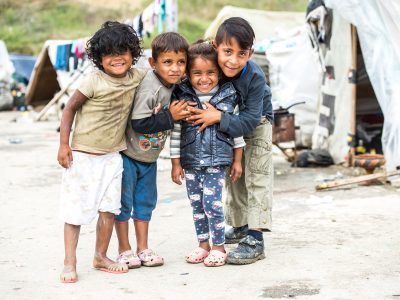
The Romani Flag. Image via Canva Pro.
April 8 is International Romani Day, celebrating the multiple cultural, linguistic, and religious identities of the Romani people who have roots in northwest India and migrated over centuries to establish themselves predominantly in Eastern and Central Europe, where they still face severe discrimination.
Romani people, also called Roma (a term meaning husband in their language), are believed to have migrated westward from today’s Rajasthan around the 11th century and arrived in Europe, most likely via Turkey, around the 13th century. The exact number of Roma people is difficult to assess as many people of full or partial Roma origin do not display it publicly, given high rates of discrimination. It's estimated between 10 to 12 million Romani people live in Europe, where they represent the largest minority on that continent. Roma people also live in the US, Brazil, Turkey, and other places in the Middle East.
Over the centuries, the community maintained a nomadic lifestyle across the entire continent, sometimes out of choice but mostly because they were not allowed to stay long in the same place. Regardless, they interacted closely with various local languages and religions. This explains that today, there are a variety of Romani languages with large borrowings from other languages that started to acquire a written form only in the 20th century, in most cases, using Cyrillic, Latin, and Greek alphabets. Also, depending on the political entities where they spent most of their time, Roma people have embraced Islam as well as Christianity (spanning across Orthodox, Protestant, and Catholic faiths).
At the same time, Romani people have kept a very strong identity based on oral traditions, part of which remains secret for non-Romani as a form of protection from centuries-old discrimination; maintenance of their language while being very multilingual; a political system electing leaders known as Kings, and a striking musical heritage that has largely penetrated European cultures, but also reducing them to the role of musicians and entertainers.
Anti-Romani laws can be traced back to the Middle Ages and discrimination has been and remains a daily reality for a vast majority of Romani people across Europe, as a number of lethal racist incidents indicate, as well as countless reports. During the Holocaust, the community was also targeted, deported, and killed in Central Europe as part of the Nazi racial ideology. Under Communism, Roma people were particularly targeted and forced to integrate into nations that could not tolerate citizens living outside mainstream society. As a result, many were forced to abandon their rural dwellings, live in prefab urban housing, work in factories, and have children forced into second-class education with no recognition of the value of Romani languages, identity, or culture. A high number of Romani women were forcefully sterilized until 1990 in Czechoslovakia, for example.
While discrimination at the workplace, in housing, education, and street-level racism continue to manifest, EU member states have put in place legislation, institutions, and funding to preserve the rights of the community with various levels of success. These include anti-hate legislation, media, and education in Romani languages, museums of Romani culture, the ombudsman, and special commissioners for Romani affairs.
In this Special Coverage, Global Voices provides stories illustrating the challenges but also joy and pride of being Romani across the world and how Roma identities are also changing with time, cultural models, anti-colonial and feminist discourses and technology.
Stories about Romani visibility in Europe
Romani language edition of the Dikan comics published in Serbia
The latest two issues of popular Serbian magazine Politikin Zabavnik include inserts with the comics Dikan, for the first time in Serbian and Romani.
Education for the Romani people: Failed by both empires
Sociological data show that about 80% of Roma children after the age of 11 do not attend school, which is similar to peasant families in pre-industrial, pre-revolutionary Russia
Serbian movie about Roma singer become a hit in several Balkan countries
Biographical movie dramatizing the life and career of Džej Ramadanovski, a Serbian singer of Romani ethnicity, has achieved commercial success in several neighboring Balkan countries.
Romani diasporas are now more marginalised in Russia than in the late USSR
There were few educational and social programs for Romani people in the USSR, and later in Russia, and there's little hope that any will be introduced in the near future.
Czech Roma need political representation: Interview with journalist Patrik Banga
To understand how Roma people assess their situation in the Czech Republic, Global Voices interviewed Patrik Banga, a Roma journalist who recently published his autobiography.
Roma musicians discuss inclusion in larger Czech community
Do the Roma musicians face prejudicial attitudes and discrimination based on their origin in Czechia?
Singled out for search at a Serbian supermarket, Roma opera superstar accuses the store of racism
Ms. Knežević was stopped and searched in public while onlookers heckled her. In her backpack, security only found sheet music, books, and a wallet.
Skopje Authorities Bulldoze Roma Families’ Homes, Then Ignore Their Plight
"Without electricity, water supply or sewage, with high risk from infectious diseases due to the floods and lack of minimal hygiene conditions, they dread the coming of winter."
Disaster Highlights Roma's Struggle for Human Rights in France
A violent fire destroyed an abandoned factory in the eastern French city of Lyon squatted by families from the Roma community, killing two women and 12-year-old child. In the aftermath, the survivors relocated into a school open only in the evenings, leaving them outside in the rain during the day. The tragedy has put the spotlight once again on France's controversial policy toward the Roma.
Slovakia: The Roma People, “Livin’ On the Edge”
Tibor Blazko writes about the problems that Slovakia's Roma people are facing and translates some of the Slovak netizens' reactions to the news that an international NGO is planning to file a complaint with the European Commission regarding the country's failure to remove all forms of racial discrimination.










